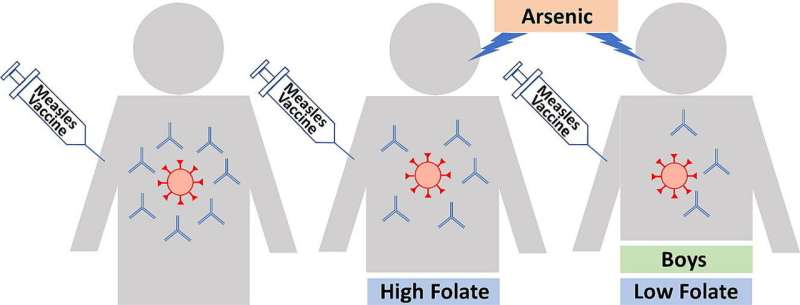This article has been reviewed according to Science X's editorial process and policies. Editors have highlighted the following attributes while ensuring the content's credibility:
fact-checked
peer-reviewed publication
trusted source
proofread
New insight into the impact of arsenic exposure on vaccine efficacy in children

A new study led by researchers in the Texas A&M University School of Public Health explores the potential adverse effects of arsenic on immune responses in children, which can make them more vulnerable to infectious diseases by reducing vaccine effectiveness. However, the study also suggests that folate—vitamin B9 essential for metabolic processes—might play a role in mitigating these effects.
Arsenic is a naturally occurring element that exists at high levels in the groundwater of some countries, including the United States, India, Taiwan and Chile. The primary source of arsenic exposure is drinking contaminated water, but it can also occur through other means, such as consuming plants irrigated with contaminated water or being exposed to tobacco smoke.
"People who have chronic exposure to arsenic are more likely to experience various health problems, including cancers and other non-cancerous diseases," said Taehyun Roh, Ph.D., assistant professor in the Department of Epidemiology and Biostatistics at the School of Public Health, who led the study. "In addition, arsenic exposure not only increases inflammation, but also suppresses the immune function, and fetuses and young children are especially vulnerable."
For the study, published in Environment International, the researchers examined how arsenic exposure affects the immunity associated with childhood vaccination for measles. Roh, along with Texas A&M School of Public Health colleagues Daikwon Han, Ph.D., Natalie Johnson, Ph.D., and three doctoral students, plus a colleague from the University of San Francisco analyzed data from the National Health and Nutrition Examination Survey to study the relationship between urinary arsenic and measles antibody levels in 476 U.S. children aged six to 11.
The team utilized biomonitoring data, including urine samples for total inorganic arsenic and serum samples for measles IgG antibody and folate levels. The team considered several factors such as age, race, smoking exposure, dietary intake of vitamin B12 and selenium, poverty index ratio, and participants' growth and body mass index. The study specifically focused on children born in the United States, as vaccination schedules and policies can vary among different countries.
The analysis revealed a significant decrease in measles antibody concentrations with increasing urinary arsenic levels in children with low serum folate levels. The measles antibody levels dropped even more as their urinary arsenic levels increased in boys with low serum folate levels. "This means that boys with high arsenic exposure and low folate intake may have reduced protection against measles," Roh said.
"Folate can mitigate the toxic effects of chronic arsenic exposure by increasing arsenic metabolism and facilitating its removal from our bodies more quickly," Roh explained.
Additionally, although the unequal impact of arsenic by sex is not yet fully understood, factors such as more effective arsenic detoxification in women, the influence of estrogen in increasing arsenic methylation, and heightened epigenetic modifications resulting from prenatal arsenic exposure in boys may contribute to this disparity.
"Our study provides valuable insights that could pave the way for further research to establish recommended folate intake or serum folate ranges, taking into account exposure to environmental toxicants," Roh said.
"Our plan is to conduct future studies to fully understand the roles of arsenic and folate in the immune system, aiming to protect children from infectious diseases and other arsenic-induced toxicities."
More information: Taehyun Roh et al, Association of Arsenic Exposure with Measles Antibody Titers in US Children: Influence of Sex and Serum Folate Levels, Environment International (2023). DOI: 10.1016/j.envint.2023.108329





















